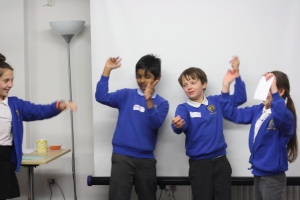International Women’s Day in Sheffield
There were many events in Sheffield to celebrate International Women’s Day. One I particularly enjoyed was a singing and dancing event hosted by Body of Sound, the choir I sing in, on Saturday 12th March at Sharrow Old School. We were joined by women singers and dancers from the Karen community, refugees from Myanmar who have been in Sheffield for ten years, and Sage, a women’s choir which has developed from the Sage Green Fingers allotment project for people experiencing mental health difficulties.
Ingrid Hanson shared two of her poems with us all. Ingrid told me that this one, ‘Dress Sense’ was inspired by the issues when her son was nine and wanted to dress up as a girl for a fancy dress day at school. I really liked it and thought it might resonate with parents and teachers who want to protect young boys from being laughed at but also want them to be able to express themselves freely. The story has a happy ending: the boy’s head teacher, on seeing the boy dressed as a girl, welcomed him warmly, saying how wonderful he looked. Everyone had a grand time. I think it is a good example of the powerful influence head teachers and all teachers have in cultivating a creative ethos around masculinities and challenging gender stereotypes.
Dress Sense
My son is nine and he wants to dress like a girl
for the fancy-dress day at school.
My son is nine and has long blond hair
and he wants to dress like a girl
for the fancy-dress day at school.
My son is nine and likes dragons and swords
and tales of fighting and valour, mystery and crime
and Sherlock Holmes and the young James Bond
and he wants to dress like a girl
for the fancy-dress day at school.
My son is nine and hoards coins and stones
and bits of string and words like discombobulate.
He reads books adorned with mythical creatures
and ancient runes in which the battles turn out well,
baddies are defeated and boy and beast
live in harmony together forever
and he wants to dress like a girl
for the fancy-dress day at school.
My son is nine and wants to be a scientist
like Albert Einstein or Isaac Newton.
He’ll build his own lab, invent something amazing
that no-one has ever quite thought of before.
He’s thrilled by the Hadron Collider,
by stars and quarks and the way that black holes work.
My son is nine and believes in magic
and the triumph of good over evil
and he waits in hope for the call to Hogwarts
and he wants to dress like a girl
for the fancy-dress day at school
and nobody wants to let him.
Because boys don’t dress up as girls,
not even for fun, it just isn’t done.
Everyone will laugh, his best friend explains,
People might laugh, his teacher agrees,
and I daren’t even think
what his grandfather would say
if he knew which he won’t
but I remember the cautionary tales
of hippy mothers who ruin their sons
by sending them to school
in clothes that aren’t cool
so I warn him: people might laugh
– although I think he looked great
when he tried it at home
prancing in the front room
in his sister’s red dress
and a pair of tights wrinkling up his legs,
his face alight with blusher and eagerness.
My son is nine and he doesn’t care
what Everyone thinks
and he doesn’t want to be a girl,
but he likes trinkets and pinks and sparkly jewels
and he wants to dress like a girl
for the fancy-dress day at school.
He knows and I know that some little girl
will dress up in moss-green trousers
with a bow and arrow
and a hat with a feather stuck in sideways
and perhaps a Disney logo on the breast of her shirt
and everyone will admire the little Robin Hood
and no-one – no-one – will even think of telling her
she shouldn’t dress like a boy
because now we all know, at least when they’re nine,
that girls can be whoever they like,
can be just as good as boys and do the things boys do.
But no boy will be Hermione or the Little Mermaid
or Pocahontas or Beauty or Rihanna
or a princess.
Because boys don’t do that.
He really mustn’t do that:
it might make him less of a man
at nine
and less of a man
for ever
and worst of all – worst of all –
Everyone will laugh.
How will he live it down?
My son is nine and he wants to dress like a girl
for the fancy-dress day at school.
My son is nine and he wants to dress like a girl for the
my son is nine and he wants to dress like a
my son is nine and he wants to
my son is nine and he
my son is nine
my son is nine
and he can
dress in
whatever
dress
he fancies
for the
fancy
-dress
day
at
school.
I’ll be the evil accomplice.
By Ingrid Hanson















